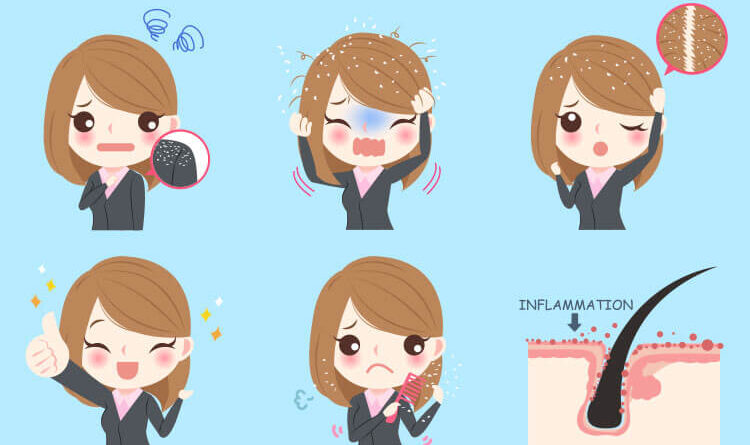Have you ever experienced an itchy scalp at night? Or even during the day as you go about your daily business? Well, the situation is undoubtedly unbearable. Literally, you will feel like jumping out of your own skin. There are a wide variety of itchy scalp causes, most of which have to do with the product exposed on the scalp or the weather.
A sure way to know that you have a looming itchy scalp in development is flakes of dandruff on your clothes. But before you despair, there is always hope somewhere. This article takes you through the causes of scalp irritation and some mitigation measures.
1. What Is An Itchy Scalp?

Scalp pruritus, as it is scientifically referred to as, is a common problem in which one’s scalp experiences a burning sensation and is characterized by discomfort and frequent scratching.
The condition is in most cases accompanied by hair care signs and symptoms such as flaking or scabbed skin. There are times when the scalp may just itch without there being any significant changes to the skin.
Although an itching scalp may not be an indicator of a severe medical condition, it may be a symptom of a medical condition that requires your attention.
2. What Are The Itchy Scalp Causes?

So, what may cause your scalp itch? Well, these causes are many and that’s precisely why this is a common problem. The following are some of the main reasons why you have an itching scalp:
a. Psoriasis
This refers to an autoimmune disease that is responsible for reddish, raised, and scaly scalp/skin patches.
Psoriasis is not transmittable from the people around you. Knowledge on the causes of this skin disorder is quite limited but it seems to be genetically tied. One stands a high chance of having it if a member of there is someone in the family with the chronic disease.
b. Tinea Capitis
Simply referred to as ringworm, this fungal infection is commonly known to cause itching and flaking. Tinea capitis normally gets deeply rooted in the affected individuals, penetrating all the way to the hair follicle. Some of its greatest impacts are huge round patches of hair loss that keeps growing as time goes by. The rash takes different appearances, sometimes stubby and other times just black dots.
c. Head Lice
What comes to your mind when you hear head lice? School children, right? It’s true that head lice are a common predicament amongst school children, but it can affect literally anyone. The common misconception that people with head lice are dirty is misplaced. In fact, different studies conclude that the parasite prefers clean head. Carefully observation may bring out tiny nits that are attached to individual hair strands. They may appear as though they are dandruff, but shaking your head cannot easily make them fall.
d. Allergic Reactions
Eczema, hair dyes, colored hairs and atopic dermatitis are also causes of itchy scalp and skin but their impact is minimal. With an allergic reaction, you will often apply something to your scalp that you didn’t know doesn’t go well with you.
e. Seborrheic Dermatitis
As an overgrowth of yeast continues to take place in your body, itching and flaking linked to Seborrheic dermatitis is bound to take precedence. The scalp and hairy areas of your body are the yeast’s dwelling locations. As they continue to pile up, this problem slowly starts to set in.
3. Itchy Scalp Treatments
There are so many skin conditions and we’ve just gone through one of them. But how can you treat this? Read on to find out.
a. Tea Tree Oil

This is an anti-fungal, anti-viral and anti-bacterial with the ability to soothe an irritating scalp and gives shiny hair texture. It is a common ingredient in most conditioners and shampoos. What makes tea tree oil tick is that it has both antimicrobial and antioxidant benefits. That means it can stand against viruses, bacteria and fungus. However, tea tree oil should never be used on its own prior to diluting it in a carrier oil, for example, coconut oil, castor oil.
b. Coconut Oil
Coconuts contain caprylic acid, which ensures they don’t get moldy and hence discourage the growth of fungus. Take advantage of this by applying some coconut oil on your scalp. In order to get outstanding results, extra-virgin coconut oil is a choice for perfect hair. Mixing it with a few tea tree oil droplets makes it even more effective for clean scalp and helps to make hair faster and thicker.
Related: How To Get Rid Of Dandruff: 7 Effective Ways To Make Your Hair Perfect
c. Use Scalp And Hair Mask

Avocado, banana and honey may sound good to eat, but do you know they could be used to eradicate your itchy head and scalp? For decades, honey has been used in treating wounds and different reports suggest that the sweet drink’s microorganisms do a pretty good work in this respect. A hair mask yields the perfect bacteria fighters and a few weeks of usage are all that’s needed to bring about some significant difference and brings out the great hair conditioning. All you have to do is smash some banana and two tbsp of honey and half avocado then use the product to cover your scalp.
d. Keep Off Inflammatory-Causing Foods
Just like candida, the fungus may be triggered by what you eat. Have healthy food for that reason, it is vital that you avoid inflammatory foods like dairy, gluten, sugar, peanuts, soy, and alcohol, among many others. To save your scalp, try to fill your diet with as many fungal foods as possible. These include foods such as ginger, avocado, banana, vinegar, coconut oil and apple cider. Eating these foods also go a long way in boosting your immune system.
e. Wash Your Hair, Combs And Brushes

Whereas itchy scalp bumps may not be entirely the product of a contagious condition, some such as tinea capitis are actually due to this. Thus, you have to maintain good personal hygiene if you are to brave itchy scalp causes. Given that ringworm is popular amongst children, it’s your responsibility to educate them on natural remedies and best hygiene practices. Like clean hair brush, combs and accessories.
“Hope you find the post helpful and we are excited to hear what you think of it!”






